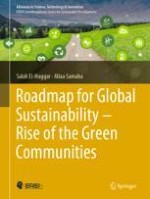2019 | OriginalPaper | Buchkapitel
10. Sustainable Slums Communities
verfasst von : Salah El-Haggar, Aliaa Samaha
Erschienen in: Roadmap for Global Sustainability — Rise of the Green Communities
Aktivieren Sie unsere intelligente Suche, um passende Fachinhalte oder Patente zu finden.
Wählen Sie Textabschnitte aus um mit Künstlicher Intelligenz passenden Patente zu finden. powered by
Markieren Sie Textabschnitte, um KI-gestützt weitere passende Inhalte zu finden. powered by
